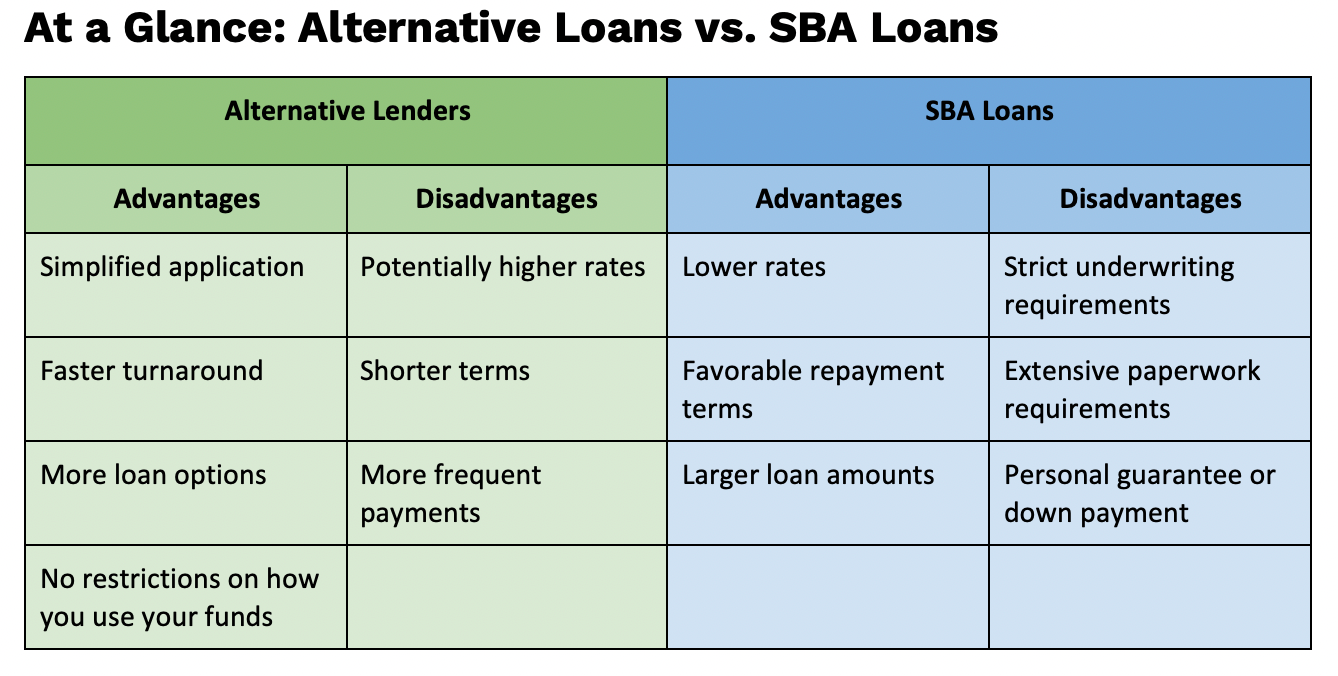Comparing small business loans: Alternative funding vs. SBA loans
Take a look at both types of funding; including what they are, their advantages, and their disadvantages.

If you are considering applying for a loan for your medical practice, the first thing you need to decide is which type of funding is right for you. There are two common options: Small Business Administration (SBA) loans or alternative funding.
In this post, we will take a look at both types of funding, including what they are, their advantages, and their disadvantages to help you determine which one is a better match for your practice.
Small Business Administration Loans
SBA loans are provided by SBA-approved lenders—including conventional banks or microlending institutions—and are guaranteed by the SBA up to a maximum amount (usually 80-90%). This means that if you default on your loan, the SBA will reimburse the lender for a portion of the total loan value.
Multiple types of SBA loans are available, including:
- 7(a) Guaranteed Loans: Funding up to $5M is available and funds can be used to cover most business expenses. Repayment terms can be as long as 25 years, with fixed and variable interest rates available.
- Express Loans: Up to $350,000 is available with a faster approval timeline than a 7(a) loan. Express Loans can be used for the same purposes as 7(a) loans.
- 504 Loans: The SBA partners with Certified Development Companies (CDCs) to provide up to $5.5M that can be used to purchase fixed assets such as machinery, buildings, or land. Funding is jointly supplied by the lender, the CDC, and the borrower. Repayment terms up to 25 years are available, with rates negotiated between the borrower and lender.
- Microloans: With loan amounts up to $50,000, SBA Microloans are primarily made available to borrowers in underserved markets, such as women-, veteran-, and minority-owned businesses. Microloans have a maximum term length of 7 years.
SBA loans offer small business owners a number of advantages, including lower rates, favorable repayment terms, and larger loan amounts. Just remember that these advantages come at the cost of strict underwriting requirements, extensive paperwork, long application timelines, and other drawbacks.
Alternative funding
“Alternative funding” refers to any lending that occurs outside of a traditional financial institution such as a bank or a credit union. It uses new technologies to support the underwriting process and provides a streamlined application that asks less of borrowers than traditional lenders. This makes it ideal for medical practice owners who wouldn’t normally be approved, including:
- Businesses that don’t meet the stringent requirements of the SBA
- Those looking for smaller loans
- Women-owned, veteran-owned, or minority-owned medical practices
- Businesses with low credit
Multiple types of alternative funding are available, including:
- Merchant cash advances: A lump sum of cash is advanced to you in exchange for a percentage of your daily or weekly debit and credit card sales. Merchant cash advances are ideal for medical practices that process a lot of debit or credit card transactions.
- Invoice factoring: A lender, called a “factor”, advances you up to 90% of the value of your outstanding invoices. You’ll receive the remaining portion (minus fees) when the factoring company receives payment from your clients. Invoice factoring is ideal for medical practices with long accounts receivable periods.
Direct online lenders offer small business owners a number of advantages, including simplified applications, faster turnaround, more loan options, and fewer restrictions on how funds are used.
The streamlined application and underwriting process makes alternative business loans easier to acquire, but it also means they pose more risk to the lender. For this reason, they come with higher rates, shorter terms, and more frequent payments.

Alternative loans makes sense for your practice if:
- You need funding quickly
- You don’t meet the strict underwriting criteria of the SBA or a bank
- You need a smaller loan
- You’ve been operating for less than 2 years
SBA loans make sense for your practice if:
- You need a higher loan amount
- You have been in business for 2 years or more
- You have strong credit and good financials
- You can afford to wait for approval
Which is Right for My Medical Practice?
Ultimately, the type of lender that is right for you depends on your financial history, the financial health of your medical practice, how quickly you need the money, how much money you need, and what you intend to use it for.
Andrea Carmine is the Content and Social Media Manager at Greenbox Capital®. With over 5 years of experience in digital marketing, social media management, content, and social media strategy, Andrea is an expert at developing and executing the company's online marketing initiatives including website content, blog posts, social media content, and email campaigns. Andrea is a graduate of Florida International University with a BA in Communication and Media Studies.
Asset Protection and Financial Planning
December 6th 2021Asset protection attorney and regular Physicians Practice contributor Ike Devji and Anthony Williams, an investment advisor representative and the founder and president of Mosaic Financial Associates, discuss the impact of COVID-19 on high-earner assets and financial planning, impending tax changes, common asset protection and wealth preservation mistakes high earners make, and more.
Is your practice ready for the Trump tariffs?
April 7th 2025Tariffs are set to drive up costs across industries — including health care — impacting everything from medical supplies to retirement accounts. Take a look at the ripple effects on medical practices and some proactive strategies for physicians to stay one step ahead.
Real Estate Transactions for Physician Practice Owners
April 26th 2021Physicians Practice® spoke with Colin Carr, CEO of Carr Realty, to find out what physicians and practice owners should know about real estate trends in early 2021 and the best practices in making commercial healthcare real estate purchases.